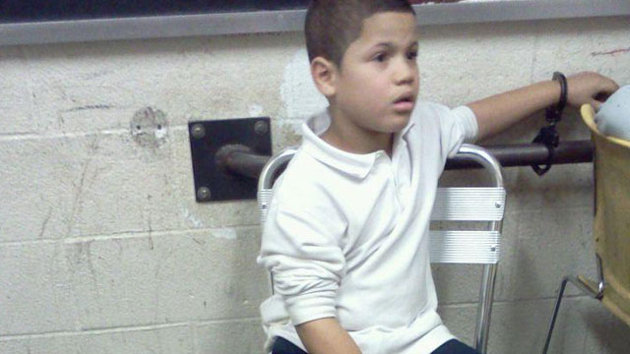In 2013, 7-year-old Wilson Reyes was handcuffed and interrogated by New York police over a lunch money dispute.
Videos by Rare
Earlier this month, news that a 9-year-old girl had been handcuffed and arrested for fighting last May in Portland, Oregon broke to much media attention and public outrage.
Portland officers David McCarthy and Matthew Huspek came to the home of Latoya Harris one week after her daughter got into a fight with another girl at the Boys and Girls club they both attended. Both girls were suspended from the club for a week, and the Harris girl apologized.
Everything should have been squared away, except the other girl’s mom called police after she saw her daughter’s bruised cheek. The officers interrogated the girl and since she, according to McCarthy’s report, “gave vague answers” and seemed nervous and cagey, they hauled her in, still clad in a swimsuit damp from her running through the sprinkler. Her mother was not permitted to come along, and it took her an hour to bus to the station and retrieve her child.
Harris says though she complained to various sources, including Portland’s Independent Police Review Division, nothing came of the matter, so she figured public shaming of the officers might do the trick. The reason the police board said there was nothing they could do? No laws were broken.
Portland law allows the handcuffing of suspects for felonies or class A misdemeanors, and fourth degree assault counts as the latter and that was the charge against the young Harris girl. After all that, the DA never charged the girl, and eventually the charges were dropped.
The savvy Ms. Harris was right about the effects of media attention and public outrage. There is now a push to change the law so that suspects in Portland under 10 can’t be taken into custody without a juvenile court order, among other small changes. This is good, but it it doesn’t change the fundamental absurdity of treating childish bad behavior like a criminal matter.
Nor does it change the fact that neither the local DA, the arresting officers, or indeed the mother who made the first frantic complaint used common sense. But American society has normalized the notion of a law and order response to every vice, every nuisance, and every bad behavior. Why should children be exempt?
Turns out they’re not — not even this month:
- Last week, an 11-year-old Vallejo, California boy who tried to tell a homeowner her car had been broken into found himself surrounded by police, guns drawn, who assumed he was the culprit.
- On May 8, Jean Baptiste, a 13-year-old Boynton Beach, Florida boy was kicked off the school bus for opening a window he was told not to — he says because perfume in the air was making his asthma act up. Baptise and a friend were cuffed when the police were called. Another friend shot cellphone video that seems to show one of the officers kicking Baptise’s leg out from under him and the boy, handcuffed, fell to the ground.
- In April, a 7-year-old boy in Kansas City was handcuffed after he reportedly screamed after becoming upset about being teased by classmates.
- An April 30 post at the American Civil Liberties Union (ACLU) blog details how a 13-year-old autistic girl was painfully restrained and then handcuffed for wandering away from school twice. When the girl fought back against the restraint, she was taken to a county detention center and held for 24 hours.
Most often, these stories of children being handcuffed, arrested, or even Tasered for minor mischief (or simply non-compliance) come from public schools. In loco parentis says, and various Supreme Court Decisions have upheld, the notion that students do not have full Constitutional rights in schools, particularly First Amendment speech rights and Fourth Amendment protections against unlawful searches.
Certainly, some of the treatment dealt out by public schools isn’t as bad as it once was. There’s less corporal punishment, and you can’t force students to salute the American flag. You can, however, suspend them for not standing, if Texas has anything to say about it.
But what has increased in the last few decades in public schools is the presence of armed police officers in public schools. Known as School Resource Officers (SROs), when they have a presence in schools, you’re more likely to end up with a lot more kids being legally punished for what was once considered expected: youthful misbehavior.
A 2013 New York Times article noted that this phenomenon has been happening since the 1990s, but after tragedies like the 2013 Sandy Hook shooting, the call for armed police in schools has grown much louder. This has resulted in hundreds of thousands of students being either arrested or given criminal citations for skipping school, fighting, or even mouthing off to a teacher.
One hundred thousand of these misdemeanor citations were written up in Texas in 2012 alone. A 2009 ACLU white paper recommended various policy changes if these SROs were to be in schools, including transparency, training requirements, and respecting the rights of students. Most vital, school policy should clearly define what is a school discipline offense, and what is actually a criminal one.
At this point, it’s almost hard to believe such policies could turn back the tide of soft, pervasive tyranny which permeates American society. Soft is not to say that it’s banal by any means, only that many of us still go through much of our day as Americans uninhibited. And when we are inconvenienced, it’s in small ways — a DUI checkpoint here or a TSA touch there.
Now, Latoya Harris’ 9-year-old being arrested in her damp swimsuit sounded absurd to people, it makes them angry. But there are scores of thousands of SWAT raids each year, the majority over narcotics. We long ago got used to the idea that armed men in paramilitary dress may kick someone’s door in at 6 a.m. because odds are it wasn’t going to be our door. Is that how we’re going to react when law and order says if you have a problem with a child, you cuff them, cite them, or arrest them?
There should be a wall somewhere; a limit to how much we tolerate this soft, acceptable, forgivable police state. More and more it demands to be a part of each transaction, each interaction, and each disagreement between individuals — even a spat between two grade school girls.



